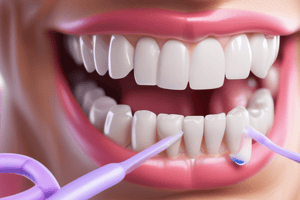Podcast
Questions and Answers
Flashcards are hidden until you start studying
Study Notes
Oral health is essential for overall well-being, as it not only affects tooth health but also has systemic implications. Recent scientific research has shown that oral health has multi-organ systemic implications, ranging from insulin resistance due to periodontal disease to more complex multi-organ systemic complications involving the cardiovascular system or neurodegenerative pathology.
The history of dentistry dates back to ancient civilizations, with evidence of dental care practices found in Egypt. The first written testimony of a dentist is from the tomb of Hesy-Re, an Egyptian scribe who lived 4600 years ago. In ancient Greece, Hippocrates and Aristotle described various aspects of dental care, including toothpaste recipes and treatments for dental issues.
Oral health is crucial for essential functions such as eating, breathing, and speaking, and encompasses psychosocial dimensions such as self-confidence, well-being, and the ability to socialize and work without pain or embarrassment. Oral diseases, which include dental caries, periodontal disease, tooth loss, oral cancer, oro-dental trauma, noma, and birth defects such as cleft lip and palate, affect an estimated 3.5 billion people worldwide.
Economic factors can significantly influence oral health. Dental care is not publicly funded in many countries, and families living in poverty often struggle to afford both a nutritious diet and dental care. This can lead to solvable oral pathologies that, in the long term, become irreversible chronic oral diseases, which can further negatively affect general health[18,19,20].
The socio-economic conditions of a citizen can have a short-term influence on oral health, which in turn can have long-term implications for overall health[18,19,20]. Encouraging scientific research in the interdisciplinary field of dentistry can help resolve and prevent systemic diseases, benefiting both clinicians and public health systems.
There is a proven relationship between oral and general health. For example, diabetes is linked with the development and progression of periodontitis, and high consumption of sugars is associated with both dental caries and an increased risk of diabetes and obesity. Oral diseases can lead to pain and discomfort, affecting concentration and causing people to miss school or work, and can lead to social isolation.
Maintaining good oral hygiene is crucial for overall health, as it helps prevent periodontal disease and its associated health risks. While the mechanisms through which oral bacteria impact overall health are not yet fully understood, certain health conditions, such as diabetes, heart disease, respiratory infections, and dementia, are more closely linked to oral health than others.
Studying That Suits You
Use AI to generate personalized quizzes and flashcards to suit your learning preferences.




